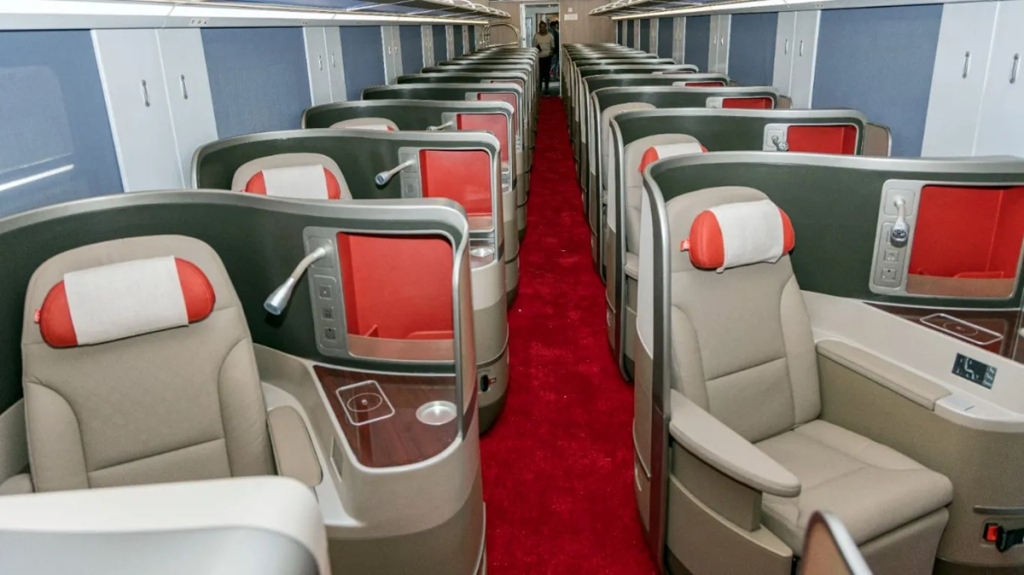Kenya Railways has unveiled a new premium service on the Standard Gauge Railway (SGR) route between Nairobi and Mombasa, offering an array of luxurious features. The spacious cabins boast fully reclining seats similar to business class on airplanes, along with top-notch entertainment options and fine dining experiences.
Passengers will enjoy plush leather seats designed for both privacy and comfort, complete with charging ports, including wireless options.
This upgrade forms part of Kenya’s broader strategy to attract affluent travellers who currently have the alternative of flying between Nairobi and Mombasa.
Passengers will also enjoy access to VIP lounges at terminals at both ends of the journey, priority boarding, and expedited security checks.
The railway company is positioning itself as a competitive player in the luxury travel market by offering amenities like gourmet meals served in an upscale setting, enhanced personal space, and a tranquil cabin atmosphere.

While the premium coaches will cater to a more affluent demographic when they open to the public next month, Kenya Railways has also made significant improvements to the economy-class coaches.
These upgrades include enhanced facilities such as four charging stations per seating arrangement, baby-changing areas, foldout tray tables, and seat pockets, ensuring that all passengers benefit from the SGR’s modernization efforts.
As a result, regardless of the class they choose to travel, the experience for every commuter will feel like an upgrade.
The SGR has already had a significant impact on transportation within Kenya, and with these new services, it is poised to play an even more important role in the country’s economic development.
It is setting a precedent for other African nations looking to modernize their rail systems.
However, the launch of these luxury coaches is not without its challenges. The high cost of tickets, which are priced at Sh12,000 (about $83) one-way and Sh20,000 (approximately $139) for a round trip, may limit accessibility for many Kenyans.
This has sparked discussions about the inclusivity of the SGR’s offerings and the balance between catering to high-end travelers and providing affordable transportation for the broader population.
“It’s costly, yes, but look at the services provided. The entertainment, spacious adjustable seats, and fine dining services are top-notch—there’s value for money. There has also been a demand for VIP First Class coaches. Last year, we registered a staggering 2.5 million passengers,” Kenya Railways Managing Director Philip Maingi told reporters during the maiden pre-trial launch.
While the premium coaches elevate the overall image of the SGR, Kenya Railways will struggle to balance this with its mandate to provide affordable transportation for all Kenyans.
This challenge highlights the broader issue of income inequality in the country, and how infrastructure developments can either bridge or widen these gaps.
What sets Kenya’s SGR premium class apart is not just the luxury but the context in which it operates.
Railways in Africa have historically been associated with functionality rather than luxury, often focusing on transporting goods and providing basic passenger services.
However, Kenya’s move to introduce such a high level of service marks a significant shift in how rail travel is perceived on the continent.
It signals a growing recognition of the need to cater to affluent travellers who are used to the comforts of business and first-class air travel and who may now find rail an attractive alternative.
Moreover, the premium class coaches are not just about luxury—they also represent a step towards greater connectivity within Africa.
Abraham Korir Sing’oei, Kenya’s Principal Secretary of Foreign Affairs, noted that connectivity is crucial for achieving Africa’s development goals, particularly under the Africa Continental Free Trade Area (AFCTA).
“We need an Africa that is interconnected, which is the vision of the Africa Continental Free Trade Area. Without connectivity, we cannot realize the AFCTA,” he said.
The SGR, which is part of Kenya’s broader infrastructure strategy, plays a crucial role in linking key economic hubs. As Kenya Railways prepares to extend the SGR to other parts of the country, including a planned expansion to Kisumu and eventually to Malaba on the Uganda border, these premium services could become a model for other rail networks across Africa.
Seth Onyango, bird story agency


